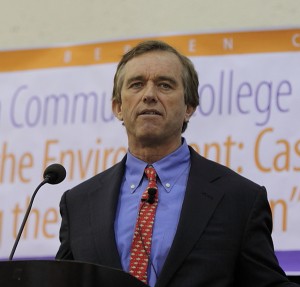
EPA Region 2 Administrator, Judy Enck speaks at Bergen Community College (2/4/11)
I’ll get around to the mountaintop mining issue, via a long and circuitous route. So bear with me as I put a political context around it.
Today, Obama Administration EPA Regional Administrator Judith Enck spoke before a large audience at Bergen Community College (for coverage of the event, see co-sponsor Bergen Record story)
I respect Enck, who is the real deal and emerged the old fashioned way: from the NY environmental activist community. She later served with Eliot Spitzer when he was NY Attorney General and NY Governor.
Enck spoke as a warmup speaker for the keynote address by Robert F. Kennedy Jr.
Kennedy did not disappoint – he made the case for the need to manage our planet and shared natural resources and respond to global warming (what Enck called “the gravest threat facing the planet”).
Seemingly contrasting our current challenges and gridlock, Kennedy traced the history of FDR’s leadership in converting the depression era US industrial base into a full employment, jobs producing war machine. He clearly longed – but did not call out Obama – for that kind of leadership to make the transition to a clean energy economy. He linked energy to national security and patriotism (2 arguments I tend to gag on).
As an example of the kind of inexorable change Kennedy claimed is rapidly being driven by market forces, Kennedy touted his own entreprenurial investments in electric car systems in Israel and the Netherlands (which only begged the question of why Kennedy seems unable to secure investments in similar US electric car production and why the US is lagging and missing these opportunities).
But perhaps Kennedy’s strongest remarks were delivered – in just one sentence – when he noted that the war in Iraq cost over $4 trillion. Less than that ($3 trillion) could provide a new alternative energy infrastructure and free energy forever. (I bet you won’t read that quote in the press coverage).
That linkage between war expenditures and domestic neglect evoked the words of Dr. Martin Luther King, who famously noted that the obscene costs of the Vietnam War diverted social investments in – and ultimately killed – the Great Society:
Since I am a preacher by calling, I suppose it is not surprising that I have seven major reasons for bringing Vietnam into the field of my moral vision. There is at the outset a very obvious and almost facile connection between the war in Vietnam and the struggle I, and others, have been waging in America. A few years ago there was a shining moment in that struggle. It seemed as if there was a real promise of hope for the poor — both black and white — through the poverty program. There were experiments, hopes, new beginnings. Then came the buildup in Vietnam, and I watched this program broken and eviscerated, as if it were some idle political plaything of a society gone mad on war, and I knew that America would never invest the necessary funds or energies in rehabilitation of its poor so long as adventures like Vietnam continued to draw men and skills and money like some demonic destructive suction tube. So, I was increasingly compelled to see the war as an enemy of the poor and to attack it as such.

Robert F. Kennedy, Jr. delivers keynote at Bergen Community College
I was disappointed not only by Kennedy’s neoliberal emphasis on market forces (as opposed to government policy), but that he politically failed to call out Governor Christie or those he referred to as the “troglodytes” and “global warming deniers” in Washington DC.
Kennedy repeatedly criticized what he called the false choice between economic development and environmental protection. He noted that pollution is inefficiency, and that capitalism and “free” markets promote efficiency. He contrasted so called “free markets” with the “crony capitalism” and corporate monoploy we suffer.
But I don’t buy this argument. So called “free markets” are a myth. Basically, it’s only a question of whether the government is intervening in markets to side with the people and the environment, or for the corporations.
Capitalism, markets, individualism, competition,and consumption (and their public policy correlaries: privatization, deregulation, “free trade”, corporate subsidies, and neoliberal economics) are at the root of our ecological, economic, and social crises.
But if you’re going to make an argument, at least back it up politically. Kennedy did not deliver on that front.
Kennedy was speaking in NJ – the belly of the right wing Tea Party backlash beast – where Gov. Christie NOW is aggressively deploying exactly the false choice Kennedy rejected, between economic growth and environmental protection. Christie is using such specious arguments to rollback environmental protections. The Christie backlash model is being replicated in several other states and by the Republicans in the House in Congress.
How could Kennedy not directly challenge Gov. Christie in Christie’s backyard?
Kennedy needs a few basic economic theory courses. No economist on the planet would disagree that pollution and public health, respectively, are examples of “externalities” )costs or benefits not reflected in prices) and “public goods” (a resource for which ownership can not be assigned and access and use can not be excluded). Other public goods include common pool resources include clean air, clean water, oceans, wildlife, etc.
Economists agree that prices, assignment of property rights, and markets fail in these cases- amounting to so called “market failure” in neoclassical economic theory.
These market failures – which are pervasive in the environmental realm – justify government regulatory intervention.
While Kennedy correctly noted that corporations are private profit internalizing and social cost “externalizing machines”, Kennedy incoherently spouted nonsense about the wonders of so called “free markets”. If he doesn’t want to engage the economic theory debate, he at least needs to read fellow New Yorker Eliot Spitzer’s justification for government intervention to address market failure (see this).
But these are long and tendentious arguments, so let’s keep it simple and just post some photos.
I want to focus the photos on one small part of what EPA RA2 Enck said (we posted previously here).
Now we finally get to the mountaintop removal issue!
At the outset of her remarks, Enck highlighted EPA’s major historical contributions, including EPA’s recent decision to revoke a Clean Water Act permit for mountaintop removal coal mining operations in West Virginia.
Enck was careful to credit EPA Administrator Lisa Jackson for that decision, and very clearly state that the mining permit was in West Virginia, not under her jurisdiction.
So I thought I’d repost photos of NJ mountaintop removal mining operations that are violating the Clean Water Act, just in case Enck is unaware of what is going on in her region on the mining front – or if she would like to launch EPA investigations or enforcement actions against same.
Traprock Mine – Hopewell, NJ (on Delaware River, off Rt 29)
Traprock Hopewell – Delaware River in background
Traprock Hopewell (about a mile east/SE, just off Rt 31)
Traprock Princeton
Traprock Princeton
Pinelands mine – in the heart of Pinelands forest
Pinelands mining desert on top of major aquifer
a Pinelands mining operation
eastern timber rattlesnake
rattle is going – excellent camouflage, no?
check out that tongue!
the standoff ended after about 10 minutes when snake decided grass was greener.
view from Overlook Mountain (Castkills, NY) – Ashokan reservoir in background
eastern view from Overlook Mountain – Hudson River in background

Are the NJ examples of quarries (basalt/diabase and sand) really comparable with coal mining in Appalachia ? In WV, they are filling and obliterating stream valleys with overburden rock and soil.
@zimmerman
Zim – of course you are correct, NJ mines not close to Mountaintop WA coal – that’s why the headline says “the NJ way” and previous said “NJ style”.
There is no valley fill, volumes are niot close, but runoff is shared problem (but again, not nearly as large an impact ehre).
I wasn’t trying to adn did not intennd to comapre them.
Holy Sh%#t! Where and when was the photo of that rattler taken?
@gary
I came acrosss him/her sunning on a trail to Overlook Mountain in Catskills.
Wait a few minutes and check back in. I’ll put a few more pics – rattling and about to strike, then coiled waiting to strike.
I stayed just outside striking range – too bad I didn’t have my big lense with me! These were shot with 24 – 70 mm.
@gary
Photos were taken 8/14/09
Awesome!
Pingback: WolfeNotes.com » Pinelands Commission Folds To Mining Industry Attack On Water Rules Designed To Protect Sensitive Ecology